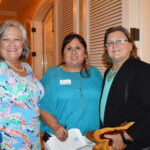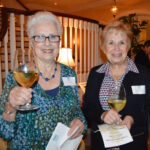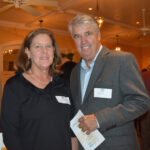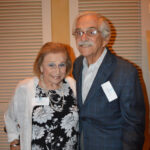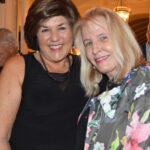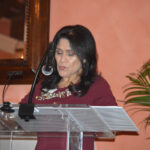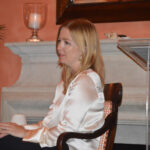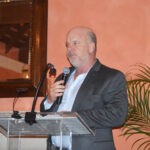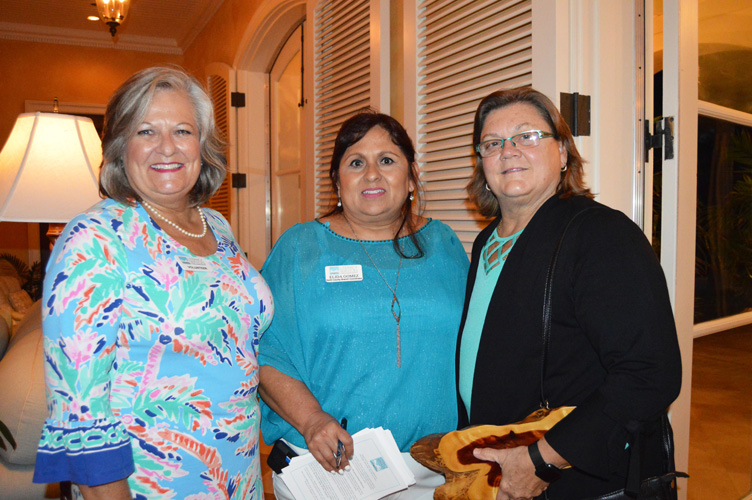
Literacy Services of Indian River County hosted an intimate gathering at the Windsor Beach Club during its Author Series last Wednesday evening featuring C. Morgan Babst, who shared the genesis for her debut novel, “The Floating World.”
Literacy Services has been enriching lives since 1971 by offering free tutoring, enabling adults and their families to increase their contributions to the community through improved literacy skills. Applying a mantra of “one page, one book, one life at a time,” the nonprofit works to end generational illiteracy through tutoring and mentorship. Students learn to read and, in the case of ESL (English as a second language) students, speak English.
“Proceeds benefit students working diligently to improve their reading and language skills,” said Jessica Schmitt, executive director to guests. “You give the gift of reading and language to hundreds of students. This gift is a tool they use to improve their lives and contribute to the community, enabling these adult learners to read a book for the first time, become United States citizens, get better jobs and open businesses.”
After enjoying cocktails and hors d’oeuvres while perusing a variety of silent-auction items, guests were introduced to Guille Cendejas, who has been working with her tutor for five years.
“When I tried to speak, people laughed at me, so I closed down and didn’t speak. Now, I speak English on the job every day and I read to my grandchildren. Someday I hope to get my GED,” said Cendejas.
Afterward, board member Lorna Stengel facilitated a casual conversation with Babst, a native of New Orleans, where her family has lived since before the city had its name. She studied writing at Yale and NYU and her essays and other works have been published in the Washington Post, Saveur and Harvard Review, among others.
Babst discussed her writing methodology, the New Orleans of her childhood and its racial history, which inspired the narrative of “The Floating World.” The book follows the saga of a fictional family devastated by Hurricane Katrina and its aftermath.
The novel hit home for some in the audience who had experienced the wrath of a hurricane firsthand, including Schmitt, who said she had read the book while hunkered down waiting for Hurricane Dorian recently.
“We live in a state of denial about our geographical and climatological situation. But we also live really big. It’s almost like life itself, to live in that sort of a situation where you know that it’s going to end. So you live a little louder and you dance a little bit harder because of it,” said Babst.
“My way of coping is to write through problems with the expectation that by making them into solid, patterned pieces of art, that I will somehow be able to put them away.”
For more information, visit literacyservicesirc.org.
Photos by: Mary Schenkel
Click HERE to see more or buy photos
- Jessica Schmitt and C. Morgan Babst
- Laura Van Beek, Gaby Besting, Sue Walker, JoAnn Connolly, Margie Zunk and Linda Pilgrim
- Pamela Larsen, Elida Gomez and Donna Remsnyder
- Sandy Mann and Lorna Stengel
- Kent Jones, Susan Hale and Don Mann
- Guille Cendejas, Larry Salustro and Linda Barker
- Mary Arnold and Marion Berry
- Wendy Stengel and Bill Stengel
- Katie and Rick Kelley
- Jayne and Alan Drucker
- Mary and Mike Fuller
- Duke and Gael Habernickel with Bill and Elissa Holmes
- Gerri Smith and Laura Moss
- John and Suzanne Hessian with Francie and Chuck Cramb
- Guille Cendejas
- Lorna Stengel and C. Morgan Babst
- Sven Frisell



